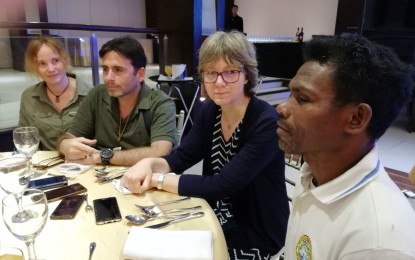
CONSERVATION EFFORTS. (From left) Johanna Rode-Margono, chair of the International Union for Conservation of Nature (IUCN) Species Survival Group; Talarak Foundation Inc. president Fernando 'Dino' Gutierrez; Kristin Leus, program officer of the IUCN Planning Specialist Group; and IP community representative Richard Impil give a briefing on the just-concluded Western Visayas Conservation Workshop on Thursday (June 27, 2019). The workshop formulated a multi-species conservation strategy to preserve and protect the five key species endemic to West Visayas. (PNA photo by Nanette L. Guadalquiver)
BACOLOD CITY -- Experts and stakeholders have created an integrated plan for the conservation of five key species endemic to West Visayas to check their dwindling population and prevent their extinction.
“They’re all in serious trouble,” said Kristin Leus, program officer of the International Union for Conservation of Nature (IUCN) Conservation Planning Specialist Group, about the critically endangered Visayan Warty Pig, Negros Bleeding Heart Dove, and Walden’s Hornbill, and the endangered Tarictic Hornbill and Visayan Spotted Deer.
Leus, who also works at the Copenhagen Zoo in Denmark, was the lead facilitator of the four-day Western Visayas Conservation Workshop hosted by the Talarak Foundation, Inc. (TFI) here until Thursday.
She was joined by Johanna Rode-Margono of the Chester Zoo in England, who chairs the IUCN Species Survival Group, Wild Pig Specialist Group.
“All of these species face similar problems. They also have similar organizations working for their conservation so it makes sense to plan for them together,” Leus said.
During the workshop, the participants determined the current status of the five species and formed a multi-species conservation strategy to preserve and protect them, including by integrating work in the field and in breeding centers.
The five species can be found in the two captive breeding centers of TFI in Negros Occidental -- the Negros Forest Park in this city, and the other in Kabankalan City in the south.
The foundation’s name, Talarak, is the local term for Walden’s Hornbill, also known as the Visayan Wrinkled Hornbill, Rufous-Headed Hornbill or the Writhed-Billed Hornbill.
TFI president Fernando “Dino” Gutierrez said the rapid decline in the numbers of these species is caused by hunting for sport, poaching for the illegal wildlife trade, and the lack of mature nesting trees in the forests.
“We’re trying to unify all our efforts to protect existing and remaining habitats and also collaborate and unite ex situ (off-site conservation) captive breeding populations within Negros and Panay. We will come up with one plan to preserve and protect these five species,” he said.
Gutierrez noted that they have identified certain areas where these species can be found, but since “they are so rare, the odds are, you will not be able to see them.”
“None of the species, except for the Visayan Tarictic Hornbill, you will have the chance to see in the wilds. We don’t even have photographic evidence (of the birds),” he added.
Last April, the TFI marked its first-ever successful breeding of the Talarak at the Negros Forest Park after nine years of waiting. The last successful captive breeding was carried out in 2010, by the Mari-it Wildlife Conservation Park in Lambunao, Iloilo.
Gutierrez said they also aim to empower the local communities along the forests to establish a sense of pride for what belongs to them.
Indigenous People’s community representative Richard Impil of Don Salvador Benedicto, Negros Occidental said they welcome the opportunity to work with the government and non-government organizations to enable them to protect the forests.
The workshop was attended by about 80 participants from various countries, including the Philippines, Singapore, Israel, Germany, the Czech Republic, the United Kingdom, and the United States. (PNA)
